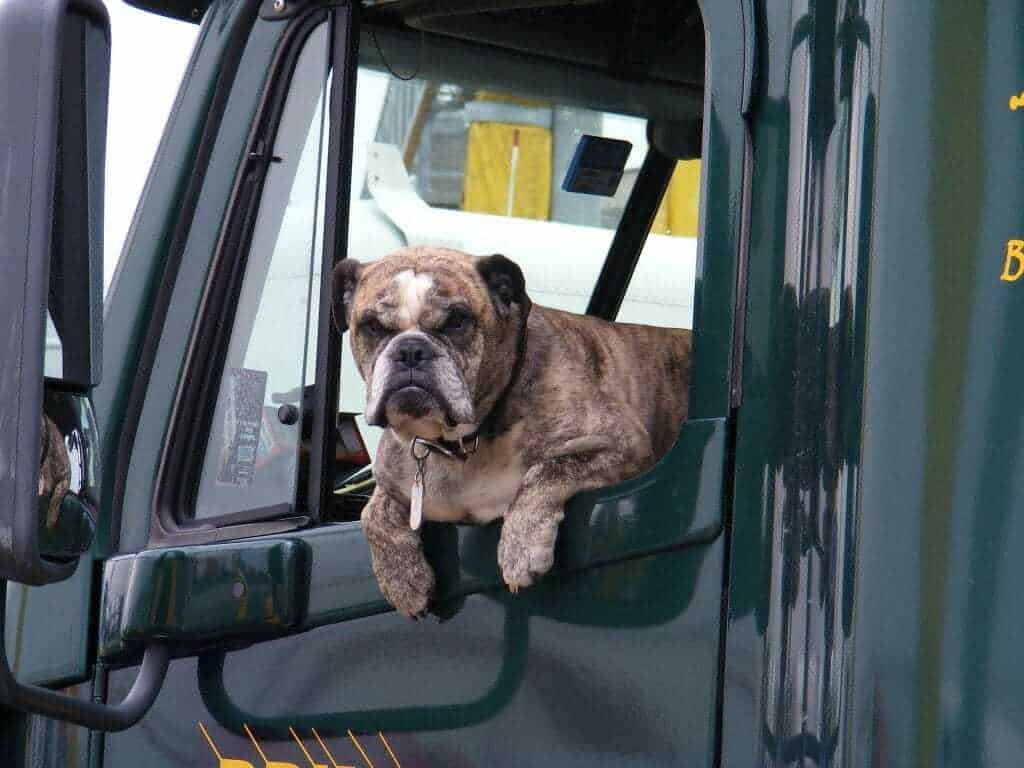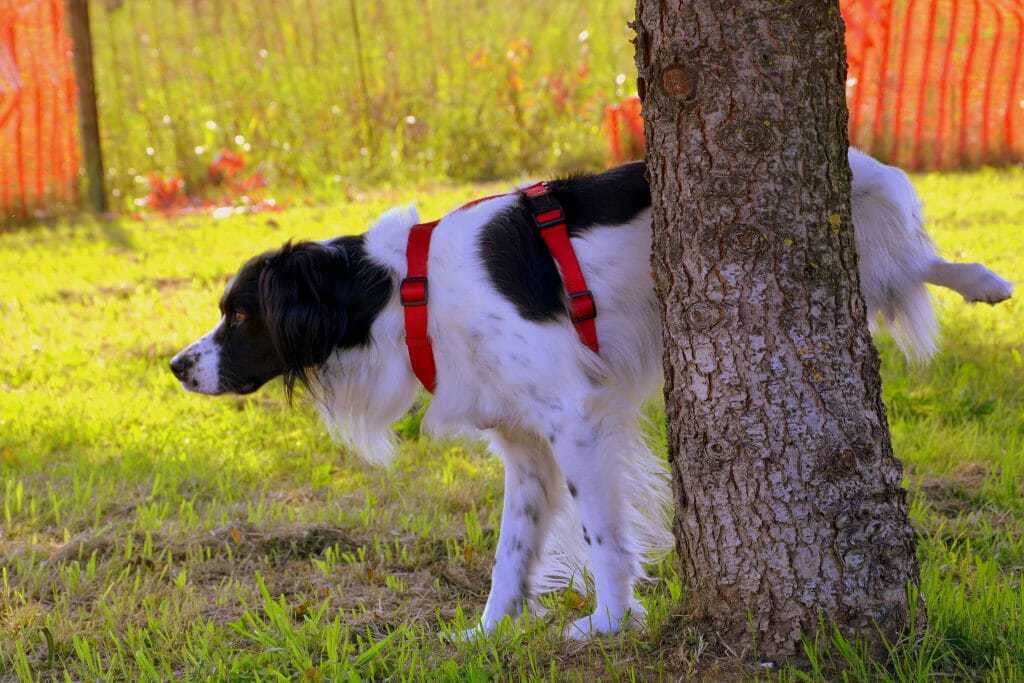Theo: A tired dog after a long walk, resting in the RV.
If you own an RV, or enjoy renting one for vacations, you already know how much fun an RV adventure can be. There are a wide range of benefits to getting out there on the open road and enjoying a range of beautiful, natural locations. What you may not realise is that your RV adventures can be as much fun for some pets as they are for you!
While (as for us) the drive there may be a bit of drag for your pets, the chance to get out there and enjoy the wilderness and experience stunning scenery and the great outdoors can be as amazing for them as it can be for us. Dogs in particular are fantastic pets to bring along on RV trips, or even to keep with you when you live full time in an RV. But certain cats, and even smaller pets, can also find a home, or a home away from home, in an RV.
We have had many epic road trips with our dog, and if you follow our advice, you certainly can too.
Can You Really Keep Pets When Living in an RV Full Time?
If you are contemplating downscaling to live in an RV, one of the things that may be stopping you is the thought that your pet or pets won’t be able to come along for the ride. The truth of the matter is that some pets will do just fine living full time with their owners in an RV. Many people living the RV lifestyle full time do keep pets. Animals are amazingly good at adapting to circumstances. While, of course, you will need to take their needs and wants into account as well as your own, and having pets does add complications, they need not necessarily be a barrier to an RV lifestyle.
Of course, there are certain things to consider when it comes to deciding whether or not keeping a pet when living in an RV is a good idea. For example, it is important to consider:
- How far you will be travelling, and where.
- How long you intend to spend on the road between stops.
- Space availability in your RV. (For pets and for all the things they will need).
- The type of animal you are considering keeping and their requirements.
- The individual character of your pet (if you already have one). Some pets are far more adaptable, calm and resilient than others.
- The financial cost of keeping the pet or pets in question.
- Legal requirements regarding the pets for the areas in which you will be travelling.
Simply considering the above and using your common sense will often give you your answer regarding whether living in an RV with certain pets is a good idea or not.
For example, while one dog may be doable – four dogs would almost certainly be far too much. A relaxed and chilled out pooch may do amazingly, while a highly strung and nervous hound may be miserable.
Can You Really Vacation in an RV With Pets?
While living in an RV full time with your pet or pets might not be a goer, that does not necessarily mean that you cannot go on vacation with your pets in your RV for shorter periods of time. While many of the same considerations apply when you are only going to be in your RV for a limited period, there are work arounds for nervous pets and for other concerns if you are only going on vacation.
One of the benefits of having an RV and being able to take vacations in it is the fact that it is far easier to take a pet with you than it is if you plan to stay in a hotel or other accommodation. Your RV gives you a way to travel, a place to sleep, and a place eat and relax without having to worry about whether or not your pet is welcome. For dog owners in particular, this can significantly simplify going on vacation with your pet. Rather than worrying about finding dog friendly accommodation, restaurants etc you just have to check that dogs are welcome at the camp grounds you are considering for night stops.
What Are the Benefits of Having a Pet When on the Road?
Dogs can love getting out to explore the world, and you can enjoy taking them there in your RV.
Having a pet with you on your RV adventures can bring its challenges every now and then. But on the whole, bringing a pet with you in your RV is an overwhelmingly positive experience, with a wide range of benefits. For example:
- Pets can offer companionship, especially if you are travelling solo.
- Stroking pets has been proven to have therapeutic health benefits, and is great for your mental well-being.
- Pets can be a source of great fun and amusement.
- Taking dogs for a walk can encourage you to get out and about while camping and mean that you get plenty of exercise.
- Pets can also become a talking point and allow you to forge connections with other campers.
Documentation You’ll Need To Bring When Taking a Pet in your RV
Of course, travelling with your dog is not all fun and games. It is important to take things seriously and make sure that you are fully prepared. For example, you will need to make sure that you bring all the relevant documentation on board. You may well need:
- Proof of ownership. (Perhaps permits for certain pets in certain places.)
- The details of your pets microchip. (We highly recommend that dogs/cats are chipped, so they can be reunited with you should they be separated from you through some accident.) If pets are not chipped, do make sure at the very least that they are wearing a valid and up to date ID tag with your phone number and details.
- Vaccination records. (Some camp grounds insist on seeing this information before they let your pet stay.)
- Documentation regarding any allergies or medical ailments that your pet may suffer from.
- Documents relating to any pet insurance that you have taken out.
- Photographs of your pet. (This is a good idea as you can use these to help find your pet if something bad happens and they go missing.)
We none of us like to think that something bad will happen. But it is best to expect the best but prepare for the worst.
Pet Safety in an RV & On RV Adventures
Before you set off, it is also important to think about how you will safeguard your pet throughout each stage of your adventure. Here are a few tips to help you keep your pet safe:
Make sure your pet is not loose in your RV while you are driving
Small pets should be housed safely in their cages or enclosures, cats should be in secure cat carriers, and dogs should either be in secure crates, or harnessed with a special car dog harness. If your pets are loose, they could easily get badly hurt, or could cause you to become distracted and have an accident while driving.
Having a dog or other pet roaming loose when driving can be dangerous. Make sure your pet is well secured.
Make sure your pet does not overheat or become dehydrated
Never, ever leave pets alone in a vehicle if it is very hot. Pets can overheat and even die if there is not adequate ventilation. Do not drive for too long without considering your pet’s water needs, and do not leave pets alone in your RV on a campsite for too long without making sure they have enough to drink, and the right temperature (an RV air conditioner can help). Likewise, when taking a dog for a walk or playing catch on a hot campsite, make sure your pal does not overheat and make sure that they always have access to fresh drinking water.
Keep your pet away from poisons and other dangers
Do not leave pets unsupervised in your RV around anything that could poison or otherwise harm them. Make sure there is no access to fuel, anti-freeze etc. and that they cannot get into any mischief. Some pets can be safely left on a campsite on their own for short periods, but you should really not leave a pet alone and unattended for too long – no matter how pet-proof your vehicle may be.
Make sure pets do not eat anything that they shouldn’t
…Or have run-ins with local wildlife
Dangers lie outside your RV too. If you are traveling to remote, pastoral or wild locations, be sure to keep a close eye on the local flora and fauna. Make sure your pet does not ingest any poisonous plants, or have any run-ins with local wildlife. For example, look out for snakes, if traveling in an area where you may encounter some… keep an eye out for large predators like bears when in the woods – these may attack dogs if they feel they are a threat – especially if they have young. Even local farm animals may pose a threat if you are not careful – cows, for example, have been known stampede dogs that get between them and their calves.
These two seem to be getting along just fine. But not all animal encounters run as smoothly. Be careful around any other animals with your pet.
Be Wary of Letting Your Pet Run Free
While, in certain places, it may be perfectly safe to let your dog off their leash, it is important to employ common sense. Consider the surroundings: other people and other animals, as well as the natural terrain. Only let your dog off leash where it is safe (and permitted) to do so.
Keeping your pet safe is largely a case of common sense. Make sure that their basic needs are met at all times and keep potential dangers in mind, and you and your pet are sure to have a safe and enjoyable time on your RV adventure.
A Pet Essentials Packing Checklist
It is almost time to hit the road. But before you go, you will need to make sure that you have everything that you need to take care of your pet and keep them happy and healthy. Here is a pet essentials packing checklist, to help you make sure that you have remembered everything:
- Food for your pet.
- A receptacle or receptacles for your pet to eat from.
- Water for your pet.
- Something for your pet to drink from. (You may like to consider investing in a no-spill water bowl to use in transit.)
- Pet’s cage or enclosure, cat carrier, dog crate or harness.
- A leash for your dog/cat.
- Bags to pick up after your dog. (You should consider getting biodegradable bags, to go greener on your camping adventures.)
- Any essential medicines that your pet may need.
- Toys for your pet and things to keep them occupied while you are travelling.
- Old towels to dry off outside pets at the door in wet weather.
When your dog likes doing things like this, and swimming in the sea, having old towels around to dry them off before they go into the RV is essential!
Pets in RVs – Troubleshooting:
While having pets in an RV is usually a positive experience, there will be certain problems to overcome. Here are some troubleshooting tips to help you overcome some of the most common problems for RV owners with pets:
Reluctant RV Campers
Some pets just don’t seem to take to RV camping trips. But that does not mean that you cannot convert them. Sometimes, you can win over your pet and turn them into an RV lover. To get pets (such as dogs) used to RV adventures:
- Try a short ‘dry run’ before taking a major trip.
- Take your pets bed or other familiar items with you so it feels like ‘home’.
- Keep to a campsite routine, so creatures of habit feel more comfortable.
- Keep pets tired out and entertained, so boredom does not kick in.
Motion Sickness
Some dogs, like this happy guy by the look of things, love to travel, while others feel a little motion sick when on the road.
Some pets can experience motion sickness – just like humans can. Pets will often get better after spending more time on the road. In the short term, you can help them out by:
- Cracking a window to provide better air flow.
- Take a break as often as possible.
- Giving them a drink and a bite to eat to settle their stomach.
Look out for the signs – in a dog these include yawning, drooling, whining and general signs of discomfort. That way you can try to prevent mess and stop before there is a bigger problem.
Water
If you find that your pet refuses water while you are traveling then you may need to stop more frequently. They may be telling you that they feel unwell, or that they need a pee break. They may also prefer cool water, so make sure you provide this as soon as you can if their water has become warm in transit.
If your pet always seems to spill their drinking water while you are on the road, then you could look into non-spill drinking solutions, or reconfigure the lay out of their area so that they can still reach water conveniently, but so that it is not in their way.
Food
If a pet refuses food, again, it may be a sign that they feel unwell. Some pets may also take some time to get used to a new regime. Motion sickness may be to blame, though it is important to rule out an actual illness. If your pet is fussy, it could simply be that you are trying to feed them something different from usual. You may have to find space to store and take with you a sufficient supply of what they usually eat.
One of the challenges for those Rving with pets is storing and keeping pet food fresh. How easy this is will, of course, depend on what your pet eats. Tins are relatively easy to store, but may not be as good for your pet as a wholefood diet. If you can, try to pick up local, ethical meat for your cat or dog rather than trying to source brand name cat or dog food on the road. (This is also a way to cut down on waste and move towards a zero waste lifestyle in your RV.)
Bathroom Breaks
When you are on the road, regular bathroom breaks are essential – for you and your pets.
Many RV owners traveling with dogs for the first time believe that their dogs are very unhappy traveling in the RV, when in fact, the problem is often simply that they have not stopped often enough to allow their dogs to stretch their legs and do their business. Make sure that you incorporate sufficient bathroom breaks into your itinerary – not just for you and other human travelers but also for dogs that are traveling with you.
Cats are generally good at finding and using litter trays. If there is a problem, make sure that the litter tray has been cleaned out and that your cat is happy with its location. If cat litter gets everywhere, consider purchasing alitter catching mat to place beneath the tray.
Exercise & Entertainment
Many of the problems encountered by first time RV traveling pet owners are caused by the fact that their pets are not getting enough exercise, or are simply bored. It is vitally important to make sure that dogs get a good walk at least once or twice a day, and ideally the chance to run around. Indoors cats may not need a walk – but they still need some fun. All pets should have adequate entertainment – both on the road and when you set up camp. Tired, entertained pets are more likely to be happy pets, and everyone is more likely to have a good night’s sleep at the end of each day.
Odours in the RV
Another common complaint for those new to keeping pets or traveling with pets in an RV are the smells that animals sometimes inevitably make. Making sure that you clean out all pet areas on a regular basis can help keep unpleasant smells to a minimum. (Incidentally, feeding cats and dogs on a healthy, whole-food diet can also keep smells down.)
Should smells linger, you can deodorise litter trays, bedding and upholstery with bicarbonate of soda… or you can just open a window.
The tips above should help you enjoy traveling with pets in your RV. The only thing that remains to decide is where your next RV adventure will take you.

Elizabeth Waddington has an MA from St. Andrews University and a Permaculture Design Certificate. She is a green living consultant, with a passion for sustainable travel, permaculture and the natural world. She lives in rural Fife, just north of Edinburgh, close to the Firth of Forth on the east coast of Scotland.
No stranger to RV travel, Elizabeth has travelled all over Scotland, the UK and beyond in search of natural wonders in her RV. Her camping adventures have taken her to the Grand Canyon, up the Pacific Coast of the US, to Yellowstone National Park, the Grand Tetons and to explore the wonders of Utah. She has travelled extensively in the Pacific Northwest, and around New England. In Europe, she has taken trips through much of the western part of the continent, travelled up to Norway, and down through Romania and Bulgaria to Istanbul. She looks forward to further eco-friendly adventures.






